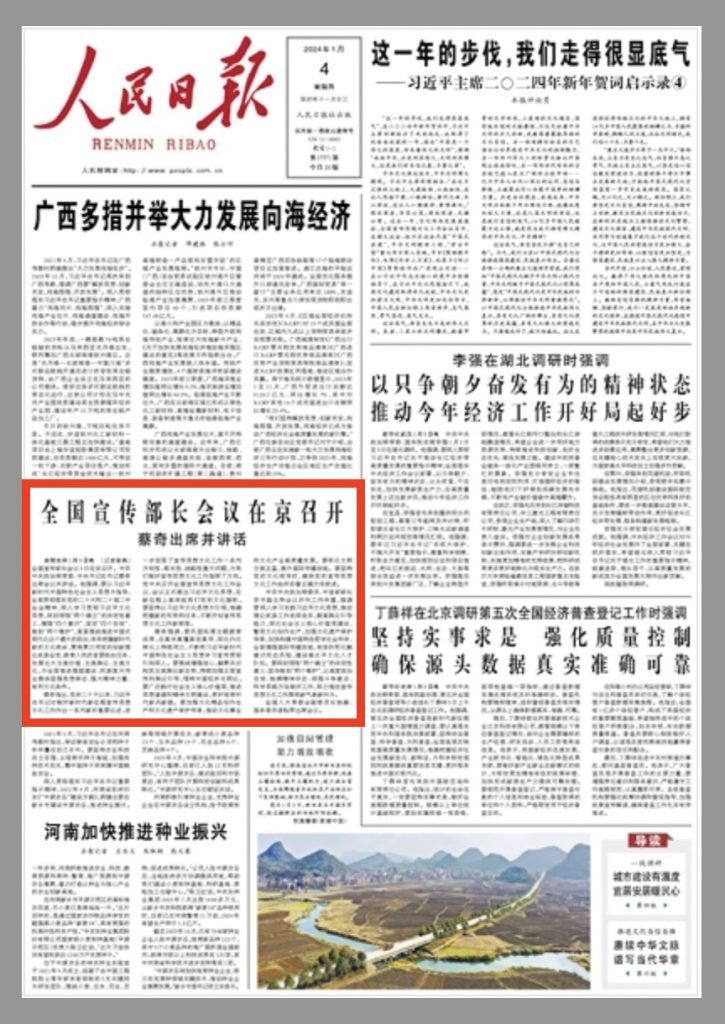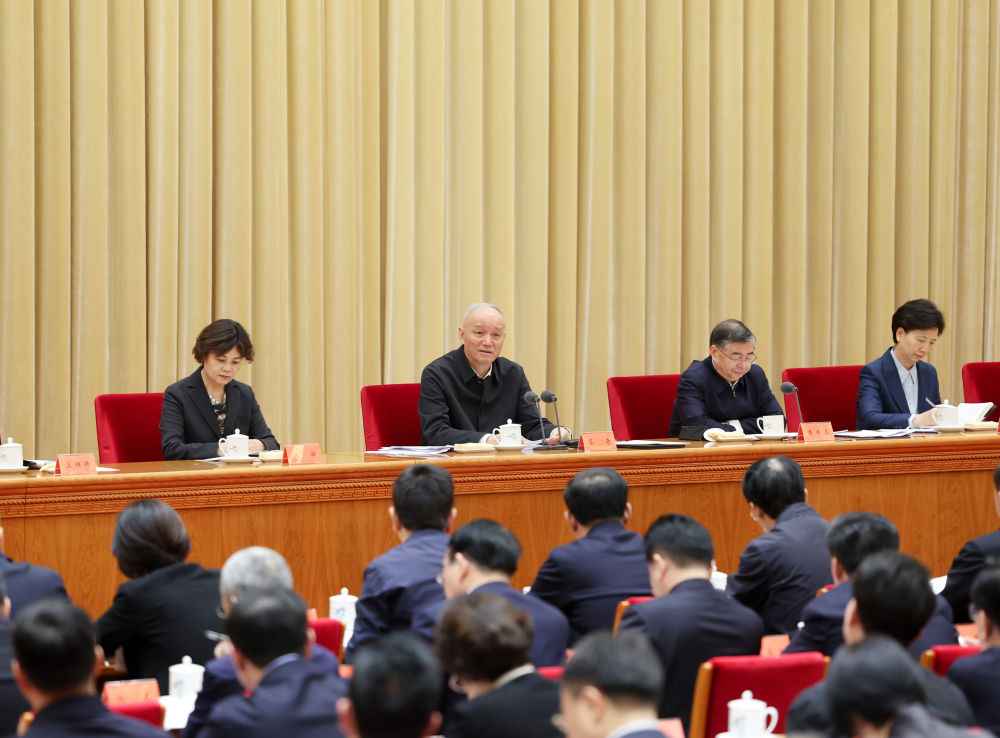
Last week, the Chinese Communist Party held its National Propaganda Ministers Work Conference (全国宣传部长会议), an annual gathering of top media control officials that lays out key priorities and sets the agenda for the coming year. This year, as last year, the main address to the conference was delivered by Cai Qi (蔡奇), the fifth-ranked member of the CCP’s Politburo Standing Committee.
As is typical practice, the official Xinhua News Agency issued a read-out of the conference that also appeared the next day on the front page of the People’s Daily newspaper. The read-out was not forthcoming about the concrete details of the work plan for propaganda officials, reportedly conveyed at the meeting by propaganda chief Li Shulei (李书磊). Instead, it dwelled on general objectives such as “raising the [Party’s] capacity for public opinion leadership” (提高舆论引导能力).

Given the limited release of information about the National Propaganda Ministers Work Conference, it is difficult to know the specifics of plans and discussions at the event — though further details could emerge in the official media in the coming weeks, as implementation is ongoing. However, several changes between the 2023 and 2024 read-outs of the conference are worth noting.
“Struggling” to Maintain Party Dominance
Most noteworthy is the repeated emphasis during the conference on the need to implement, uphold, and adhere to “Xi Jinping Thought on Culture” (习近平文化思想). This phrase is a permutation of Xi’s political banner phrase that emerged very recently, in October 2023. At the time, Party-state media strongly promoted the phrase as a “significant milestone” (里程碑意义) in the elaboration of CCP theory on culture and ideology. As we pointed out in our related analysis at the time of the term’s emergence, Xi’s ideas on culture and civilization have little to do with culture and center on the imperative of its control by the CCP.
“Xi Jinping Thought on Culture” appears four times in the short Xinhua read-out from last week’s conference, and the phrase will likely continue to have a major role both in reiterating Party control over all aspects of culture, including the media, and in asserting the idea that Xi himself has been instrumental in leading China toward a civilizational revitalization.
Also emphasizing the highly political nature of culture under Xi Jinping’s CCP, the read-out this year references the need to “maintain the Party’s cultural leadership” (坚持党的文化领导权), as well as the urgency of guarding against “ideological risks” (意识形态风险). Neither of these phrases was included in the read-out from the 2023 National Propaganda Ministers Work Conference. Also newly included in this year’s read-out was language about the CCP maintaining the “will to struggle” (斗争意志) on political matters, chief among these obedience to Xi — the clear focus of last year’s meeting.
A total of 34 national meetings of the country’s top propaganda ministers have been convened by the CCP leadership since the middle of the 1980s when the gathering was regarded as necessary to set the tone for propaganda and ideology under the broad changes introduced since the late 1970s when China had embarked on a new program of economic reform and opening.

The first — and to date the longest — was held from November 15 to December 2, 1984, when CCP General Secretary Hu Yaobang (胡耀邦), who was active at the time in promoting key political reforms, encouraged propaganda leaders to push the so-called “Four Modernizations” (四个现代化) adopted in 1977, which defined the path of economic reform and invigoration but stopped short of democratization. During the Democracy Wall protests of 1978, former Red Guard and prominent dissident figure Wei Jingsheng (魏京生) proposed democracy as China’s “Fifth Modernization,” and was eventually arrested and sentenced to 15 years in prison.
But by January 1988, when the second National Propaganda Ministers Work Conference was convened in Beijing, led by Hu Qili (胡启立), the first secretary of the CCP Secretariat, political reform was on the agenda. It was a time of intense debate within the CCP leadership, epitomized on media and propaganda issues by the debate between the liberal editor-in-chief of the People’s Daily newspaper, Hu Jiwei (胡绩伟), and the hardline press official Hu Qiaomu (胡乔木), the former personal secretary of Mao Zedong (and an early opponent of reforms) who in the 1980s was a speechwriter and propagandist for Deng Xiaoping. Hu Jiwei, a proponent of political reform, argued that in doing journalism the “people’s spirit” (人民性) of the media should be primary — meaning essentially that the media should report truthfully because it represented the interests of the people. This idea of the role of the media was firmly rejected by Hu Qiaomu, who argued for the primacy of the “party spirit” in media and journalism, meaning that CCP control should be emphasized and enforced.
It is a tension that remains at the heart of the broader question of propaganda and the role of the media in China, though the hardline approach of Hu Qiaomu has notably dominated under Xi Jinping, whose insistence in 2016 that all media be “surnamed Party“ (姓党) — meaning that they must serve the CCP’s interests at all times — is a reference to the notion of “party spirit.”
Two conferences of national propaganda ministers were held in 1988, the second coming in October of that year, six months before the death of Hu Yaobang ignited pro-democracy demonstrations across the country, culminating in the brutal crackdown of June 4. The events of 1989 had a dramatic impact on press policy and practice in China, and on the course of political reform [Read more in “How a Massacre Shaped China’s Media”]. When the next National Propaganda Ministers Work Conference was convened in July 1989, the objective was to reassert the Party’s control over the media and propaganda, on the premise that misguidedly open media policies under Premier Zhao Ziyang (赵紫阳) in the spring of that year had contributed to the “chaos” [See “Guidance of Public Opinion”].
Since 1989, the National Propaganda Ministers Work Conference has been held consistently in January of each year, though meetings were not held in 1993 and 1994, a period during which the country was undergoing another radical reform shift following Deng Xiaoping’s “southern tour” in January-February 1992, which was already underway as ministers met in Beijing on January 22-25, 1992.




















